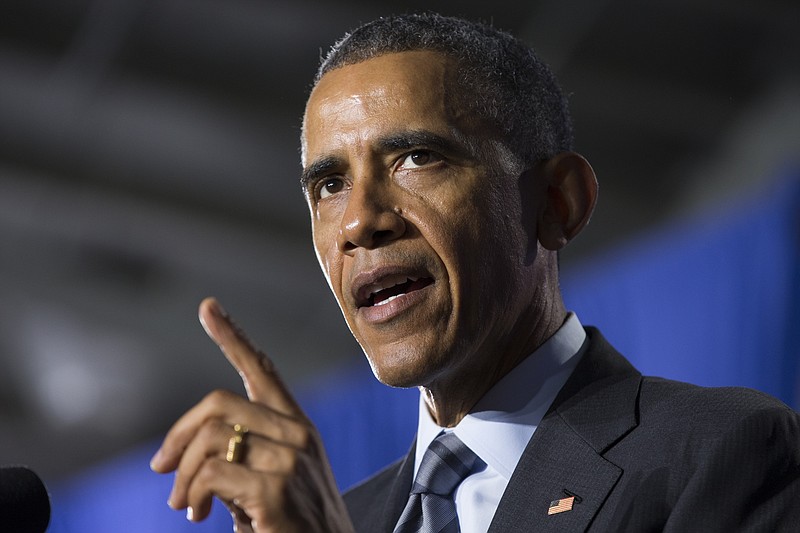The president's winning budget
If the Republicans and conservatives (who seem to have suddenly discovered a soft spot for the middle class over the Koch class) want to put our money where their mouths are, they will make a real effort to find common ground and pass much of President Obama's fiscal 2016 budget. And hopefully they will do this without gutting the Department of Homeland Security over immigration reform.
Speaking of immigration reform, the budget assumes the reform will pass. In fact, the budget counts on $160 billion in savings from it as the reform would add younger tax-paying workers to the workforce and help balance out the costs of an aging population, extending the life of the Social Security trust fund along the way by providing more workers to pay taxes into that program, too.
But the big winners would be parents -- both poor and middle-class parents -- who would receive tax credits of up to $3,000 per child. Another big winner would be the construction industry since infrastructure spending is a big part of the the jobs-building budget out-go.
The biggest losers? The rich. According to the Tax Policy Center, 99.6 percent of Americans in the top 1 percent of incomes would see their tax burdens rise. Likewise, businesses that make money overseas would face a 14 percent "transition tax" on that overseas money for starters. A higher rate would follow.
It is not a "balanced budget." Obama's proposal carries a $474 billion deficit price tag in 2016, and it includes deficits in each of the next 10 years, but the White House says the deficits, all under 3 percent of projected Gross Domestic Product, would still be scaling back the size of federal deficits.
It's a safe bet this alone will make deficit hawks (folks who think any and all debt is bad) feel like big losers, too.
After all, it's a bit like saying you're lowering the upward creep on your credit card debt instead of paying off the card and cutting it up. But lowering the creep is not to be sneered at. It's a continuation of something this administration has been doing for years now. In fact, even Politifact rates as true Obama's claim that his administration has cut the deficit at the fastest rate in 60 years.
That, too, sounds like a winner.
'To Kill a Mockingbird' will fly again
To this day -- more than several decades after my first (of many) readings of Harper Lee's Pulitzer-winning "To Kill a Mockingbird," it remains my all-time favorite book. Come July, I'll likely have a second favorite.
Lee, now 88, will publish a second novel this summer: the sequel, sort of, to Mockingbird.
The novel, titled "Go Set a Watchman," was actually Lee's first book. Completed in the mid-1950s, it had many of the same characters, but was set when Scout Finch, the child heroine of "To Kill a Mockingbird," was grown up and looking back on her childhood.
Lee told The New York Times that her editor at the time was taken with Scout's childhood flashbacks, and told her to write a different novel from Scout's perspective. She said she set the earlier book aside, and thought the draft had been lost or destroyed. Then last fall, a friend discovered the manuscript attached to an original typescript of "To Kill a Mockingbird."
"I was a first-time writer, so I did as I was told," Lee said of her editor's rewrite advice.
Unlike Lee, I've never been one to do what I was told, so when I carried the page-worn paperback of "To Kill a Mockingbird" to my mother to ask if she thought I would like to read it, her answer lit a fire: "I think you're a little young still to read that book," she said.
I looked again at the picture of Gregory Peck in a courthouse on the book's cover, shrugged and headed back toward the bookshelves. Once I turned the corner in the hall, I put the book under my shirt and headed outside for my favorite reading spot -- a gnarled apple tree with a broad, low-lying limb that formed a barky hammock just below a ripening wild grape vine. The grapes -- and the book -- were rich.
The advice of Lee's editor was clearly good. (So was my mother's, as she likely knew her off-hand hesitation was the surest way to get me out of dog and cat books and into literature.) Not only did "To Kill a Mockingbird" win the world's biggest writing prize, it also has become a classic, was adapted into a 1962 film and has sold more than 40 million copies globally since it was published in 1960. It continues to sell more than one million copies a year, and has been translated into more than 40 languages.
But in that apple tree, it put skin, bones and tears on a quintessential story of the South, racial prejudice, injustice and family love. Set in Alabama during the Depression, it tells the story of Scout and her family as they get swept up in the trial of a black man accused of raping a white woman. Scout's father, played by Peck in the movie, is the accused man's lawyer.
The day I turned the last page in that book shaped me, and doubtless many more like me. I can hardly wait for July.
